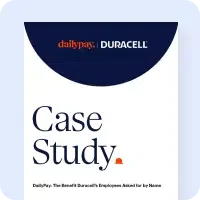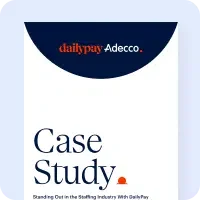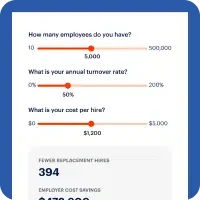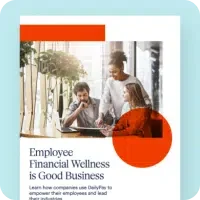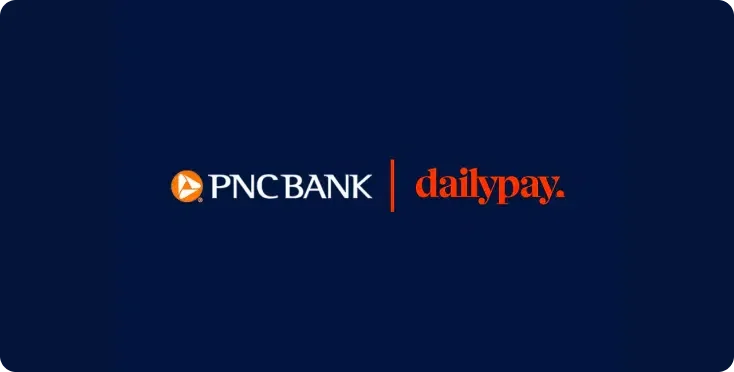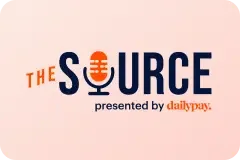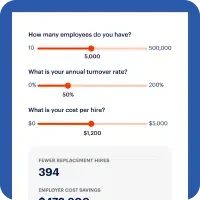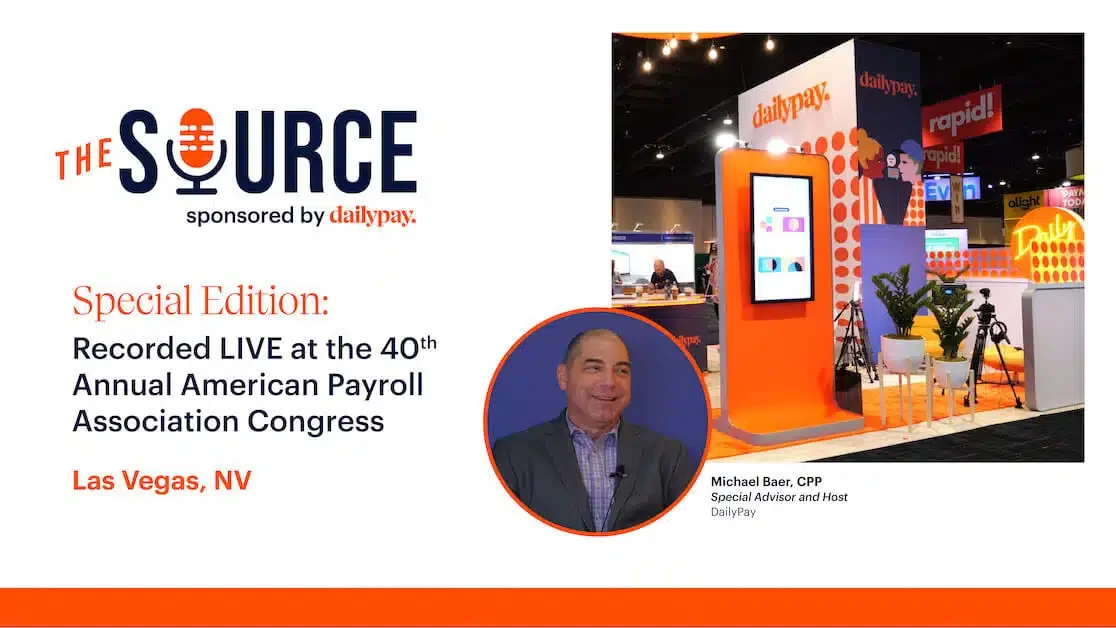It was the biggest week of 2022 for payroll and the Source is on the scene. Join Michael Baer, CPP, the host of the Source by DailyPay, at the DailyPay booth during the 40th Annual American Payroll Association Congress. He talked with several luminaries of the payroll industry to get their impressions on the latest trends, how they weathered the pandemic, how they feel about getting together again the first time in three years, and how payroll has changed.
Those interviewed include:
- Fred Basehore, CPP, Guidehouse
- Dee Byrd, CPP, Clear Course
- Linda Dailey, CPP, Booz Allen Hamilton
- Levi Meeske, CPP, Sage Software
- Michael Schoelles, CPP Bright Horizons
- Christine Stolpe, CPP, Consultant
- Pete Tiliakos, Alight
- Denene Thompson, CPP, Premera Blue Cross
- Jazlyn Williams, Bloomberg Industry Group
Transcript
Michael Baer, CPP, Host:
It’s the biggest week of the year in payroll and the Source is on the scene. I’m Michael Baer, the host of the Source by DailyPay. And we are here in the DailyPay booth at the American Payroll Association Congress. And we have been talking with several luminaries of the payroll industry to get their impressions on the latest trends and the coming out of the pandemic, how they feel about the different issues that have come up. This is the first time in three years that payroll professionals have been able to get together like this at the APA Congress. How do you feel about that?
Levi Meeske, CPP, Sage Software:
So last time that we were all connected was in Long Beach California. And in some ways it seems like there’s been this massive gap, in other ways it’s like it would never get here, but ultimately seeing the friends, the family, the… Just being back amongst people again is so exhilarating. And it’s been a phenomenal Congress.
Dee Byrd, CPP, Clear Course:
I’m excited to see people in person again. You forget how much of a family the APA is to you. It’s just amazing to just be able to see people, one, to know they’re all okay because that’s another thing you just didn’t know how they were wearing the storm, if you will. So it’s been really good to see a lot of folks come back. I’m glad to see y’all as vendors coming back too. I know you guys have the same struggles with travel, so it’s really good to see y’all here too. And you guys are part of that same family. So it’s like we see you too. So I’m really glad to be back in person.
Fred Basehore, CPP, Guidehouse:
Oh, it’s great. It’s absolutely great, Mike. I’m just glad to see everybody again and be able to interact instead of just being talking on the phone, it’s just really, really nice.
Denene Thompson, CPP, Premera Blue Cross:
I feel warm, connected. I love that meeting faces again. Seeing faces again and meeting new people. I like the collaborations, the classes that I’ve been attending. I’ve had a chance to do what I like to do, which is step out of my comfort zone. Reach my hand out and say, “Hello, my name’s Denene, what’s your name? Where are you from?” And it’s been great.
Michael Schoelles, CPP Bright Horizons:
It’s been just fantastic. Seeing all the old friends and faces and making new friends. I look forward to this conference every year just for that fact. There’s the laundry list of people, and you look and you say, “Oh wow. So and So who’s going to be there. Can’t wait to see them and reconnect and see how they’ve been for the last three years.”
Jazlyn Williama, Bloomberg Industry Group:
It feels amazing, honestly, the energy’s very different and it’s great getting to just, getting to run into people around breakfast time and getting to exchange ideas that way, it’s just not the thing that happens in a virtual space. So the idea sharing has been great.
Linda Dailey, CPP, Booz Allen Hamilton:
I am a very big people person and I really love the interaction to be face to face with people. So I’m so excited. I’m running up hugging people, talking through situations, learning a lot of information here at the conference. It’s so much easier for me to be in person than it is to be virtual.
Christine Stolpe, CPP, Consultant:
Over the moon. Absolutely over the moon. There’s a connection, when I get to see my people and touch my people and hug my payroll people and have these conversations, where we’re actually exchanging energy and not just ideas, we have to have this, we need this as payroll professionals. We’ve had semi empty tanks if you will, since the shutdown started. And this is how we fill our tanks every year and we’ve all been running on fumes. So it’s nice to see the employers who’ve allowed people to come back out and come to the, in real life events, so that we can start exchanging that energy again.
Pete Tiliakos, Alight:
This is my first one in my 30 year career. You mentioned that in the beginning and I’m just, I mean, I’m over the star over the moon being here and I’ve spoke this week, it’s been phenomenal. I had the amazing conversations all week long and it’s really refreshing to see that leaders and organizations are really noticing payroll is a priority, making it a priority and really starting to say, “Hey, we need to figure out how we start to digest some of these solutions and make our organization better and level up.”
Michael Baer, CPP, Host:
What do you see are some of the biggest changes in payroll in general that have happened in the last three years?
Fred Basehore, CPP, Guidehouse:
We’re used to working in an office as a team, and now everyone’s working from home for the most part and trying to get systems set up and do I have a printer at home? And can I get into my company’s network? And all those things. So it was quite the transition for many people.
Michael Baer, CPP, Host:
And then you had to worry about security issues too, I’m sure.
Fred Basehore, CPP, Guidehouse:
Absolutely.
Linda Dailey, CPP, Booz Allen Hamilton:
So I actually fought leaving the office. My boss had to tell me, “Go home.” I was the only person on our floor, go home Dailey, go home.
Michael Schoelles, CPP Bright Horizons:
Oh, I mean, some of the biggest is all of the COVID related rules and regulations that are stayed and even local specific you had the Pennsylvania localities, you had California, of course, California is always an adventure. As well as all of the federal tax credits and deferrals and whatnot, and being able to properly track and record it so that you could claim your credits and validate it when asked, because the next question was from the outside auditors, “Prove that those numbers actually work.”
Dee Byrd, CPP, Clear Course:
One of the big ones for me is just that I think that the payroll profession has come out of the back office and I’d hate to use that term, but there are a lot of organizations that that’s what it was. And so one, we did exactly what we always do, we stepped the heck up and took the charge and made sure people got paid when folks couldn’t even leave their homes. I think in addition to that, we had to step change really fast, to be able to make sure folks could get paid. If they hadn’t got on to some form of electronic payment, then we had to give those solutions to our employees and we just, yeah, did it, you know what I mean? That’s just what we do. And I think one of the big things too, that’s come out of it is the recruitment of talent because now that they’ve realized that we can work from anywhere and get payroll done, talent can be found anywhere as well. Because if you stay remote, then your options have opened wide.
Denene Thompson, CPP, Premera Blue Cross:
There’s been a bunch. I think the number one thing back in March of 2020, when we were told we were going to go home for two weeks, that I thought we have never processed a complete payroll outside of the payroll office. And that it may be a little chaotic to get that first payroll done. And yet it went seamless.
Michael Baer, CPP, Host:
Seamless.
Denene Thompson, CPP, Premera Blue Cross:
Seamless, no issues-
Michael Baer, CPP, Host:
That speaks volumes. Wow.
Denene Thompson, CPP, Premera Blue Cross:
Exactly. No issues systems were up. Probably the only issues we had, had nothing to do with processing and that was everybody forgetting to take themselves off mute when those various meetings. But yeah, everything else was fine. Internet stayed up in all our different homes. Everybody got paid. It was wonderful. And I think that we, learning from that, we learned that we need to find a new way to do payroll, that what we did for the last X number of years, yeah it worked, but we saw that we can make a change and probably even do better and find new ways to be more creative, more innovative and make it faster, better, stronger, all of that good stuff.
Levi Meeske, CPP, Sage Software:
I think the biggest thing is probably Nexus in terms of, we now have more employees working from home.
Christine Stolpe, CPP, Consultant:
I think one of the things that is going to stick is the electronic world of the payments. And I think what’s not going to stick is the requirement of seats in the seats. I think we’ve proven, even though we didn’t get called essential at the beginning of the shutdown, except by one country, thank you, Jason, in Australia for getting that done. But they were the only country that recognized payroll professionals as essential. And then the UK came not too long after that, but the US never did. So we weren’t allowed to return to the office. We were forced to figure out how to pay people who either were unbanked or under banked. There was no way to get the funds to them other than if FedEx the checks to their homes. And that put a lot of employers already who were having problems with, how am I going to keep the doors open, sending out checks to people at 10 bucks a pop with FedEx. And it just, it became really overwhelming. So I think a lot of employers had to figure out how to electronically, get the money to the employees.
Michael Schoelles, CPP Bright Horizons:
Payroll could never be done from home, how dare you even insinuate that. And now I’ve got people that are like, “If you bring me back to the office, I’m not coming back.”
Jazlyn Williama, Bloomberg Industry Group:
When March of 2020 really hit, there was an influx of executive orders from governors, all of them trying to tackle this whole issue of experience ratings and benefit charges because the unemployment rate went up and just ever since then, it’s just been a constant stream of unemployment news, every single state in DC and Puerto Rico, they’ve all had such different ways of trying to balance this issue with trust fund solvency, but also just trying to really keep the burden off of employers. So it’s been interesting seeing that challenge over the past few years. So it’s just been a much busier part of the payroll field.
Levi Meeske, CPP, Sage Software:
Figuring out better business continuity plans. Most companies have always had a disaster recovery, business continuity process procedure, and they may have even gone to the point of testing it a few times. But when the 13th of March 2020 hit, I can remember everything shut down, go home, take what you need, we’ll be back in a couple of weeks. And that couple of weeks turned into a couple of months, which turned into a couple of years. Through it all payroll has had to adapt to be able to function in brand new environments, to be able to collaborate with each other, to exchange securely, documents that previously you were able to just give to somebody next to you and to be more ready for the next whatever in the future. Hopefully not a pandemic, but payroll goes through many different cycles and through it all, payroll keeps going.
Linda Dailey, CPP, Booz Allen Hamilton:
In my situation. Anyway, we are going to be in our company completely remote forever.
Michael Baer, CPP, Host:
Forever?
Linda Dailey, CPP, Booz Allen Hamilton:
And I like the hybrid model where you can go into the office and we will have that opportunity if we need to, but we’re mostly virtual. And I think the interaction is great, but it’s also missing that human contact. The collaboration is completely different with your team. I have a team of two on my team and I’m purposefully do team meetings and include them in every decision that we try to make, to make sure that we’re all collaborating together or trying to collaborate together to make it even better than what it is.
Jazlyn Williama, Bloomberg Industry Group:
The whole issue of the mobile workforce has just been incredible to watch unfold because I feel like the technology has been there for longer than this pandemic, but the way the pandemic hit, it forced a lot of companies to take that technology and really refine it and bring things forward. I think a lot more quickly than we would’ve otherwise seen. And it’s like, well, that’s a cat that’s out of the bag and it’s just, it’s not going back in that bag. And so the tax and wage and hour implications of that, it’s something that’s really changing the payroll landscape.
Christine Stolpe, CPP, Consultant:
Paperless has to be the way of the future, it just has to be and behind that is going to be mobile. Everyone’s going to have to go 100% mobile.
Dee Byrd, CPP, Clear Course:
Since COVID, because we had to have a way to pay people, when a lot of people were maybe reluctant to be on any form of electronic payment for whatever reason. So now we are just trying to find ways to get folks paid. And also you think about it. There are a lot of those industries, like I think a fast food where you’ve got a younger generation working and they were having a hard time staffing them for that matter. So it was a way for them to give them an added benefit to say, “Hey, you can get get paid every day if you want to.” If that’s what your employer will do.
Dee Byrd, CPP, Clear Course:
So it just was, it was just something that, and it is something that is, it’s just like another benefit on the list of benefits you’re offering your folks. And I mean, you get in an Uber, they’re doing it. You go into KFC, I see it in there too. So it’s becoming, I think, way more prevalent. And I think the more understanding that folks have, which was one of the reasons for the articles, because myself, I understood it to be something completely different until I had a conversation with you at our last, at PLC, actually at Payroll Leadership. And I’m like, “Oh my gosh, totally different understanding.”
Michael Baer, CPP, Host:
I could see that light go on in your head-
Dee Byrd, CPP, Clear Course:
Yes, the light bulb went off. I’m like, “We’ve got to ride about this.” Because if I didn’t know about it and I’ve spent years on the electronic subcommittee, if I didn’t really understand it, then I knew our membership, there was no way they could truly understand it. Because they were thinking, we had this big old rampant in the marketplace pay cards. And then that was there for a number of years and everybody understood what those were. And then now we’re looking at on-demand paid or early wage, advanced wage payments or, and we are thinking literally it’s just another advance form.
Michael Baer, CPP, Host:
It’s another form of an advance, it’s just more automated. But yeah.
Dee Byrd, CPP, Clear Course:
And that’s really not what it is.
Michael Baer, CPP, Host:
That’s not what it is, right.
Dee Byrd, CPP, Clear Course:
It’s not what it is at all. And so that was the reason for the article, is I absolutely know that somebody read that and had a light bulb moment like I did.
Michael Baer, CPP, Host:
And this is one of the thing that impresses me is that how well the payroll professionals like yourself have been able to respond and seamlessly pretty much, handle all the different payments plus all the other brand new requirements that were brought on by the pandemic. I’ve really applaud you all for all that because you made it again. Once again, payroll looks easy, on one hand you guys make it look easy, so everybody thinks it’s an easy thing.
Linda Dailey, CPP, Booz Allen Hamilton:
I was going to say, “Mike don’t that all we do is press buttons. We only press buttons. That’s our job.” I had an executive tell me that one time. And I dragged him to my office and said, “Okay, here’s what I have to do before I can press a button.” And his mouth dropped and he actually respected me for showing him what I did. I was like, “Don’t do that ever again.”
Dee Byrd, CPP, Clear Course:
In 2007, we tried to pass the Multi-State Taxation bill and it’s went from one congressional session to another yeah, and never passed. And so one thing they’ve had to look at is that exact setup, having some thresholds and the states went into a frenzy to, when it all happened, New Jersey, New York fighting over who was going to get-
Michael Baer, CPP, Host:
Massachusetts.
Dee Byrd, CPP, Clear Course:
Yeah, exactly. So, I think that just like, there’s some good things that came out of it because I think that’s going to advance that a lot faster than it would have.
Michael Baer, CPP, Host:
It elevated that issue and made it a little more visible.
Dee Byrd, CPP, Clear Course:
Yeah, the awareness. Because I think even, I remember I actually testified to Congress when we first were trying to pass that. And one of the things I thought was just amazing to me is the Senator from California, who’s no longer in office, but she asked me, “Well, if we pass this bill, then what would your job be?” Like That was our only job. And I thought the awareness or lack there of what we do. And I just looked at her, I said, “There are so many other things.”
Michael Baer, CPP, Host:
The ignorance. Yeah. There’s a lot of ignorance out there about payroll’s role. I think for the overall economy too. So I’m hearing innovation focus, like you just said, but also what I’m hearing is the profile of payroll over the past three years has just been rising within organizations because people are recognizing just how critical the function is and how important. And what it can do to aid the overall operation.
Pete Tiliakos, Alight:
Payroll’s got this rich pool and resource of information that I would argue most organizations probably don’t put enough respect on. Maybe they can’t trust that data because they’re not in a modern operating environment, but once they enable that and they can tap into that data. We heard some great stories yesterday, at the innovation keynote, around using data and telling a story and championing change in the organization by way of payroll. And that is possible. And you’re right, it’s changing the role. I’ve had a few conversations with leaders and practitioners about how the roles are becoming more analytical and more advisor like in their teams. And they’re getting away from that ticking and tying simple processor and becoming more of a technology driven, insights enabled group that can really help the business navigate compliance and meet their strategy.
Michael Baer, CPP, Host:
So how does it feel being payroll man of the year?
Levi Meeske, CPP, Sage Software:
I’m not sure if it has fully set in, it was a complete surprise. I’m very humbled by it. This association has afforded me so many opportunities to be able to get involved, to give back to the many people who have helped mentor me and this is just another step to allow me to help mentor the next generation of payroll professionals,
Denene Thompson, CPP, Premera Blue Cross:
Because we all join our jobs for whatever we do under the sun, selling something, making something, producing something. But we also join it to get that paycheck. And when we were able to, like you said, make that conversion and to know that I can still be me and do my wonderful things and still get my paycheck. Yeah. I think it did bring us… Give us a little recognition that some of us gave us before, but not enough. So we’re getting a little bit more now.

